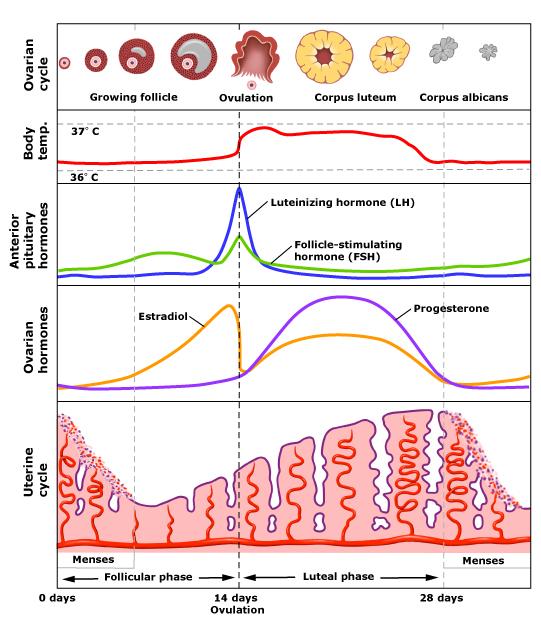Some women experience heavy blood flow and clotting during their menstrual cycle. On average a woman with a “normal” menstrual cycle should only shed 2 to 3 tablespoons (30 to 44 milliliters) of blood during menstruation shares Dr. Aviva Romm, Integrative Medicine Doctor, Herbalist and Midwife, in Botanical Medicine for Women’s Health. Every woman is unique and her menstrual cycle is as well, but if you have concerns that you may be bleeding too much during your period, it may be a good idea to learn what is considered within the “normal” range.
In this article, we will discuss symptoms and causes of heavy menstrual bleeding/menorrhagia, potential risk factors to rule out, and natural remedies known to help, such as Vitex (Vitex agnus-castus), Maca root (Lepidium meyenii), DIM and natural progesterone cream.
What is Heavy Menstrual Bleeding?
Heavy menstrual bleeding is called Menorrhagia. It is defined as a woman who loses 5 ½ tablespoons (80 milliliters) or more of blood during their menstrual cycle (Botanical Medicine for Women’s Health).
Symptoms include:
- A menstrual cycle that lasts beyond 7 days, though up to 10 is still considered within the normal range if there is not excessive bleeding
- The need to change a sanitary pad or tampon every hour, for consecutive hours and days
- The need to double up protection, even thick pads are soaked through
- Bleeding through heavy pads while sleeping
- Large blood clots
- Feeling tired, fatigue or shortness of breath
Causes of Menorrhagia
Some women experience heavy bleeding during their menstrual cycle, but they are still ovulating and the heavy bleeding may be contributed to slight hormonal imbalances. Please know that one-two days of heavier bleeding can be normal, particularly days 2 and 3 of menstruation. Most women who are experiencing excessive bleeding during menstruation find it’s prolonged due to ovulatory dysfunction, in other words, they are not ovulating correctly. This is most often due to hormonal imbalance.
Women with a normal menstrual cycle usually have a balance of estrogen and progesterone. Follicle Stimulating Hormone (FSH) is released by the pituitary gland which signals the follicles to release estrogen. This signals the endometrium (lining of uterus) to begin to grow in preparation for ovulation and hopefully conception and implantation of the fertilized egg. The continued release of adequate amounts of estrogen by the mature egg, once released at peak amount signals the release of Luteinizing Hormone (LH). This signals the release of progesterone and the endometrium begins to build up in preparation for implantation. The release of LH also signals the egg to be released; this is ovulation. If conception never occurs, the progesterone levels drop and the uterine lining sheds as menstruation.

In women who have menorrhagia there is a disruption in the release of the hormones. This hormonal imbalance may show up as excessive menstrual bleeding because one of the functions in the ovulatory cycle was not triggered and the endometrium may have grown excessively. If not enough estrogen is released to trigger LH, ovulation does not occur which also does not trigger enough progesterone. Adequate amounts of estrogen and progesterone are needed to regulate the amount of blood to be built up in the uterine lining. Insufficient progesterone levels are linked to heavy menstrual bleeding.
Other Risk Factors To Rule Out
Menorrhagia may also be contributed to other risk factors according to the Mayo Clinic. It is important to rule out other causes of excessive menstrual bleeding so that you can get a proper diagnosis, which will help you to know what healing methods will be most effective or appropriate. According to researchers at the Palmer College of Chiropractic in Davenport, Iowa, “Shapley, Jordan and Croft (2002) reported that of 22% of women over the age of 35 with heavy bleeding, only 7% discussed their symptoms with their doctor.” This is simply not a female fertility health issue to pass of as something you have to “just deal with” or ignore. It is important if you have excessive menstrual bleeding to see a doctor that can help you to find the causes for your particular case.
- Uterine Fibroids and Polyps
- Endometriosis
- Blood disorders caused by coagulation issues, this may be genetic
- Medications or herbs that thin the blood, anti-inflammatory medications, and anti-coagulants. Systemic Enzymes and Dong Quai (Angelica sinensis) used in excessive amounts may contribute to excessive bleeding and should not be used without guidance by women with heavy menstrual bleeding.
- Adenomyosis is a condition in which the cells from the endometrium become embedded in the uterine muscle. This most often happens to women who are middle-aged and have had children.
- Thyroid problems
- Pelvic Inflammatory Disease (PID)
- Rarely liver or kidney disease
- Rarely cancer of the uterus, cervix or ovaries
- Miscarriage, if this is your first time experiencing heavy menstrual bleeding there is a chance you are having a miscarriage.
Once you and your doctor have ruled out more severe risk factors, such as those above, you can work toward determining if your estrogen and progesterone levels are within normal range. It is also important to know if you ovulating. Remember that some women with heavy menstrual cycles are still ovulating, but those with extreme excessive bleeding not related to above risk factors usually are not.
Note: If you have been diagnosed with one of the above risk factors, please seek treatment for those particular needs or refer to our guides for natural remedies that may help with those conditions.
Natural Remedies to Help with Heavy Menstrual Bleeding
Addressing Hormonal Imbalance
Fertility Cleansing
Excess estrogens may “congest” the liver and contribute to low progesterone and overall hormonal imbalance. Fertility Cleansing may help to promote hormonal balance by gently cleansing, toning and promoting regeneration of the liver cells. The uterine cleanse phase of fertility cleansing promotes healthy circulation to the uterus, strengthening the communication loop between the uterus, ovaries and endocrine system. This uterine portion of the Fertility Cleanse also works to tone and heal the uterus, which helps to expel old blood and tissues.
The Fertility Cleanse is a great way to create a foundation for proper hormonal balance.
Vitex
Vitex supports hormonal balance in the body by having an effect on the hypothalamic-pituitary-ovarian axis (hormonal feedback loop), correcting the problem at the source. Vitex has been found to help normalize ovulation and progesterone levels. Research Scientist Christopher Hobbs, Ph.D., L.Ac. A.H.G., shares in Vitex: The Women’s Herb of one 2-year study, Vitex was used to treat 51 women with Menorrhagia and Polymenorrhea (bleeding occurring often, with a less than 21 day cycle); 64% of the women reported improvement starting within 2 to 3 months of treatment . No side effects were reported.
Maca
Maca is a nourishing food for the endocrine system, aiding both the pituitary, adrenal, and thyroid glands (all involved in hormonal balance.) Maca helps to stimulate and nourish the pituitary gland, acting as a tonic for the hormone system. When the pituitary gland functions optimally, the entire endocrine system becomes balanced, because the pituitary gland controls the hormone output of the other three glands. Maca is a wonderful super food to support overall hormonal balance by providing support and nourishment for the systems that control hormone release and production.
DIM
DIM stands for diindolylmethane. DIM stimulates your body to metabolize bad estrogens. DIM increases specific aerobic metabolism for estrogen; this, in turn, multiplies the chance for estrogen to be broken down into good beneficial estrogen metabolites (2-hydroxy estrogens)(in all about DIM by Michael A Zeligs, MD and A. Scott Connelly, MD). When the good estrogen metabolites are increased by the DIM, this creates a reduction in bad estrogen (16-hydroxy estrogens) which have the potential to cause cancers, endometriosis, uterine fibroids, etc. Good estrogen metabolites protect the heart and brain with antioxidant activity. Increased bad estrogen may be promoted by obesity and exposure to man-made environmental toxins. DIM promotes healthy estrogen metabolism.
Progesterone
Because Menorrhagia is linked to progesterone deficiency, you may want to learn how natural progesterone cream can boost your natural progesterone levels.
Healing alternatives for heavy menstrual bleeding from the medical profession according to Women’s Health Expert Dr. Christiane Northrop include nonsteroidal anti-inflammatory drugs (NSAIDs), about which she says, “…I prefer to try natural progesterone first, if that doesn’t work, a strong synthetic progestin such as medroxyprogesterone acetate (Provera) can help. (This is the only circumstance in which I recommend the synthetic.)”
Natural progesterone cream can help to supplement your body’s own progesterone levels and lead you back to a state of natural balance.
Acute Support of Heavy Menstrual Bleeding Times
Note: These should only be used during heavy bleeding.
Slow Flow
Slow Flow is an herbal and nutrient formula to promote normal menses, and is to be used on heavy bleeding days. Slow Flow uses astringent herbs, uterine tonics, and nutrients to support normal menstrual flow. It combines these herbs: Ginger root, Cranesbill root, Periwinkle herb, Yarrow flower, Liferoot herb, Shepherd’s purse herb.
Heavy Bleeding Infusion (Tea)
Combine
2 parts dried Yarrow (astringent, reduces bleeding)
2 part Shepherd’s purse (astringent, reduces heavy uterine bleeding, prevents hemorrhage)
1 part dried Nettle leaf (high in iron, astringent, prevents hemorrhaging)
½ part Hibiscus flower (high in Vitamin C, nice flavor addition)
Place a small handful of the mixture into a quart glass mason jar. Fill with just boiled water, cap tightly. Steep for 30-40 minutes. Drink 3-4 cups a day.
Heavy Menstrual Bleeding and Anemia
Women with heavy menstrual bleeding are at high risk for developing iron deficiency, which is a type of Anemia. It is important if you have heavy menstrual bleeding to supplement with a good wholefood iron supplement as well as eat a wholefood diet rich in iron. A wholefood iron supplement is easily absorbed by the body and does not cause constipation like most prescription and over the counter iron supplements.
Foods rich in iron
Heme Iron
|
|
Non-heme Iron
|
|
When to Seek Medical Care
It is important to seek the guidance of a medical professional if you are experiencing severe bleeding in excess of two menstrual pads completely soaked every 30 minutes. Excessive bleeding of this amount is considered hemorrhage; call your doctor right away if you are bleeding this much. Excessive bleeding can lead to death, so this matter is not something to take lightly.
It is also advised you see a medical doctor or naturopathic doctor to determine the cause of your heavy menstrual bleeding.
- Zeligs, M., & Connelly, A. S. (2000). All about DIM (diindolylmethane). New York: Avery.
- Menorrhagia (heavy menstrual bleeding). (n.d.). Retrieved from: http://www.mayoclinic.com/health/menorrhagia/DS00394
- Romm, A. J. (2010). Botanical medicine for womens health. St. Louis, MO: Elsevier.
- Livdans-Forret, A. B., Harvey, P. J., & Larkin-Thier, S. M. (2007). Menorrhagia: a synopsis of management focusing on herbal and nutritional supplements, and chiropractic. The Journal of the Canadian Chiropractic Association, 51(4), 235-46. Retrieved from https://www.ncbi.nlm.nih.gov/pmc/articles/PMC2077876/
- Chevallier, A. (1996). The Encyclopedia of Medicinal Plants. New York: DK Publishing, Inc.
- Hoffmann, D. (1992). The new holistic herbal: a herbal celebrating the wholeness of life. New York: Barnes & Noble.
- Northrup, C. (October 9, 2006). Heavy Menstrual Bleeding (Menorrhagia). Retrieved from https://www.drnorthrup.com/heavy-menstrual-bleeding-menorrhagia/
- Olson, C. (2005). The vegetarian mothers cookbook: whole foods to nourish pregnant and breastfeeding women– and their families. Nipomo, CA: GOCO Pub.





